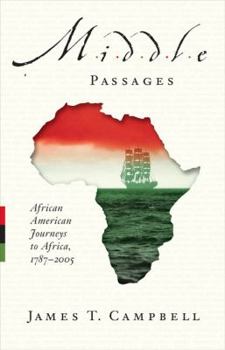Middle Passages: African American Journeys to Africa, 1787-2005
Select Format
Select Condition 
Book Overview
Penguin announces a prestigious new series under presiding editor Arthur Schlesinger, Jr. Many works of history deal with the journeys of blacks in bondage from Africa to the United States along the... This description may be from another edition of this product.
Format:Hardcover
Language:English
ISBN:1594200831
ISBN13:9781594200830
Release Date:May 2006
Publisher:Penguin Press
Length:513 Pages
Weight:1.90 lbs.
Dimensions:1.4" x 6.5" x 9.4"
Age Range:18 years and up
Grade Range:Postsecondary and higher
Customer Reviews
2 ratings
Fascinating
Published by Thriftbooks.com User , 16 years ago
Campbell takes a fascinating twist on the typical meaning of the term "Middle Passage" which often highlights the horrors of capture and the even more horrific ocean-crossing from Africa to America. Instead, "Middle Passages" weaves together accounts of African Americans who crossed the Atlantic from America back to Africa. In so doing, Campbell writes a compelling narrative of the pull back home that will provide insight to readers of all races. Reviewer: Bob Kellemen, Ph.D., is the author of Beyond the Suffering: Embracing the Legacy of African American Soul Care and Spiritual Direction , Spiritual Friends: A Methodology of Soul Care And Spiritual Direction, and Soul Physicians.
"What is Africa to me?"
Published by Thriftbooks.com User , 17 years ago
James Campbell's wonderfully written history of African American journeys to Africa, from the late 1700s to the 1990s, explores the changing answers that black Americans have given to this question. Posed in a famous 1925 poem by Countee Cullen, this question is the flip side of another: "What is America to me?" African Americans have always had to negotiate their double identity: How much American, how much African? In this erudite but very accessible book, Campbell follows African American missionaries, expatriates, writers & journalists as they each experience some part of Africa and interpret it within their own American intellectual frameworks. He shows how different generations of black Americans saw Africa through the cultural lenses of their own eras (religious, scientific, literary) and were also influenced by the current status of blacks in the United States. Each chapter focuses on the personal stories of one or more African Americans, including 19th century missionaries & emigrants and 20th century authors & expatriates, some famous and some not: Paul Cuffe, Martin Delaney, William Henry Sheppard, Langston Hughes, W.E.B. DuBois, Richard Wright, Maya Angelou, and many more. In the process, he highlights many important episodes in African history, from the settlement of Sierra Leone & Liberia through the atrocities of the Congo Free State and independence in Ghana to the Rwandan genocide & Africa's First World War. Although filled with historical details, the book is never dry or dull; Campbell writes like a storyteller and focuses on individuals, supplementing his narrative with quotations from their own works. The last chapter is a study of three African American reporters (two from the Washington Post and one from the New York Times) who worked in Africa during the 1990s. Campbell's account of their divergent responses to common events shows how much his theme still resonants, especially but not only for black Americans: how one interprets America determines how one sees Africa, and vice versa.




